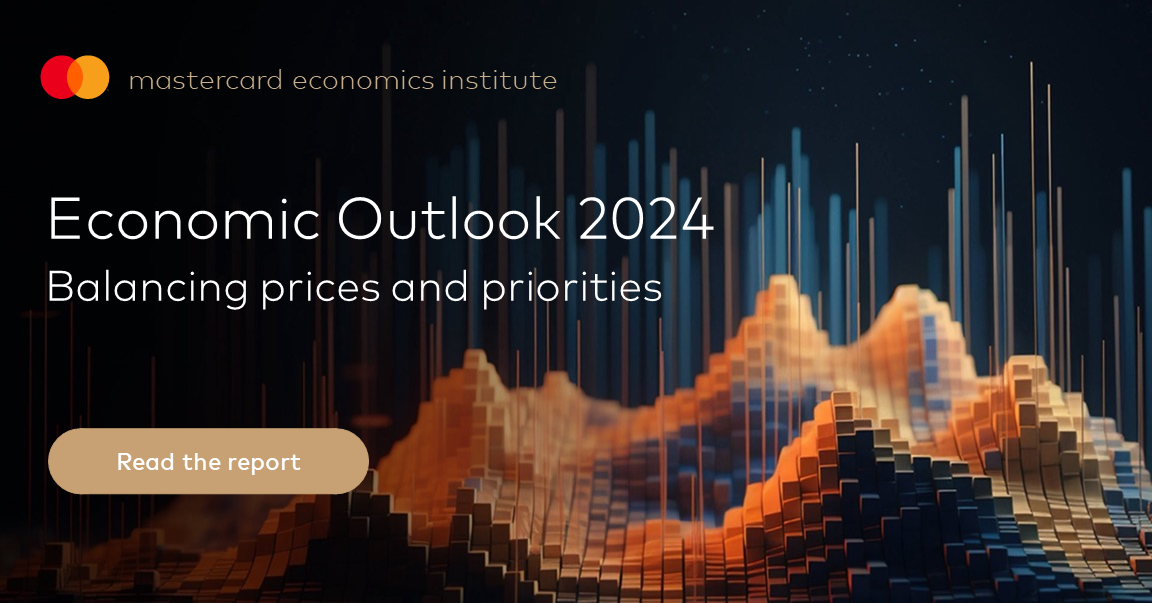Economic Outlook 2024: A year of consolidation as inflation stabilizes in Latin America
January 8, 2024 | Miami, FLMIAMI - January 8, 2024 - The Mastercard Economics Institute (MEI) released its “Economic Outlook 2024”, an annual report revealing key themes that will define the economic landscape throughout the year. This year, inflation pressures across most economies should ease. According to the MEI, inflation globally (consumer price index) is expected to moderate to 4.9% year over year (YOY) in 2024 from 6.0% in 2023. The annual report draws on a multitude of public and proprietary datasets, including aggregated and anonymized Mastercard sales activity, as well as models that are intended to estimate economic activity to identify the themes that will define the global economy.
While inflation will be lower, it is expected to remain above the pre-pandemic trend of 2.7%. Removing inflation, “real” growth in 2024 is likely to feel like 2023 - the MEI expects real global GDP growth of 2.9% YOY in 2024, compared to 3.0% in 2023.

According to the report, there are three common themes for the global economy this year: an empowered consumer, easing inflationary pressure and a course correction for central banks. Reflecting these global themes, targeted measurements reveal the regional impacts across 45 markets, including forecasts for Latin America. However, the narrative very much differs across regions and those differences are driven by social and political tensions, geopolitical risks, cost of living, access to credit, debt sustainability and currency depreciations.
Economic Outlook 2024: Latin America
Next year, most of Latin America will be reaping the benefits of its tumultuous, but persistent commitment to stabilizing inflation. In 2024, MEI forecasts a GDP growth slowdown in key Latin American economies, as the final stretch of the disinflation process will be smooth rather than the hard landing that typically follows high-inflation episodes in the region. The policy rate cut cycle is set to provide relief to consumers, whose debt service has climbed in the face of high rates.
Brazil and Chile have taken the lead in the region in this cycle, with Colombia and Mexico staying behind for different reasons – sticky core and food inflation in Colombia and remarkable economic resilience in Mexico. In 2024, MEI expects rate cuts to spread through the region and to support households as they consolidate their debt.
In this situation, consumer spending growth should moderate compared to 2023 but remain resilient on the back of strong labor markets. Also, sustained global demand for commodities remains key to economic performance, while the possibility of higher food prices is a key risk factor.
Alternatively, the continued easing of monetary policy will help sustain consumer spend in interest-sensitive sectors, while income-sensitive sectors are likely to lag as households control their expenses. The good news is that labor markets will remain strong in the economies that have outperformed. In addition, labor markets will finally turn the corner in the region’s underperforming economies, with real wages expected to show modest, but consistent growth.
As Latin America pursues a smooth slowdown, the key downside risks are external. An economic slowdown abroad, especially in China and the U.S., is the greatest potential threat to Latin America’s economic performance in the year ahead.
A slowdown in China would hit the economies of South America particularly hard through a decline in demand for agricultural products and metals. Central America and the Caribbean are more vulnerable because of the U.S. slowdown from weaker exports and lower remittances.
While the global economy will feel more “normal” in 2024 than the prior three years, it is still an economy in the process of rebalancing. This means consumers and corporations will be mindful of how to prioritize their spending and investment in an environment of shifting relative price differentials and higher borrowing costs.
Adding to these macro dynamics are the continued behavioral changes by consumers in how and why they shop. In a global economy that is still fluctuating, this year, empowered consumers will look to find their equilibrium by carefully balancing prices and priorities.
To read the full report, visit Economic Outlook 2024.
Media Contacts
About Mastercard (NYSE: MA)
Mastercard is a global technology company in the payments industry. Our mission is to connect and power an inclusive, digital economy that benefits everyone, everywhere by making transactions safe, simple, smart and accessible. Using secure data and networks, partnerships and passion, our innovations and solutions help individuals, financial institutions, governments and businesses realize their greatest potential. With connections across more than 210 countries and territories, we are building a sustainable world that unlocks priceless possibilities for all.